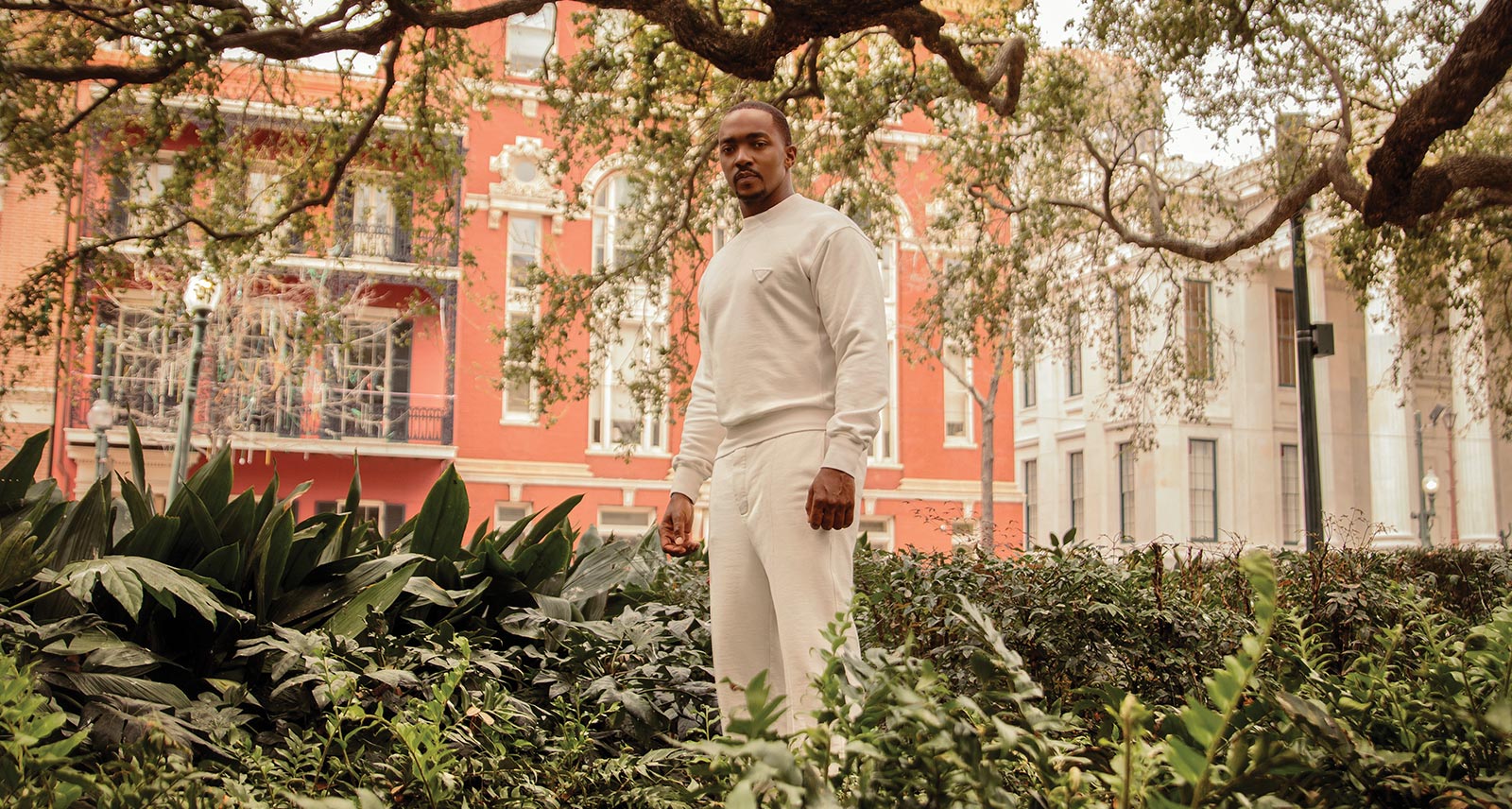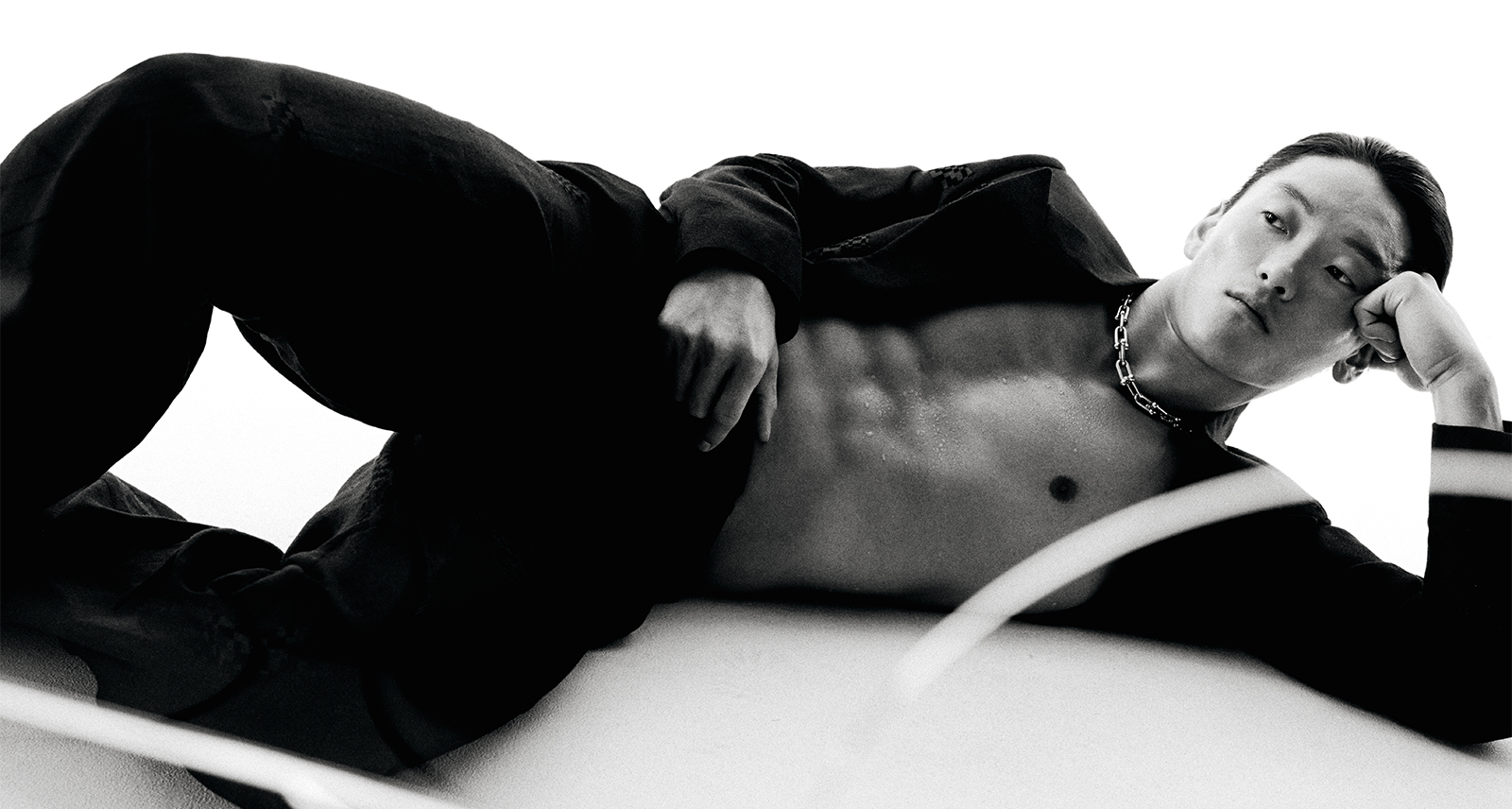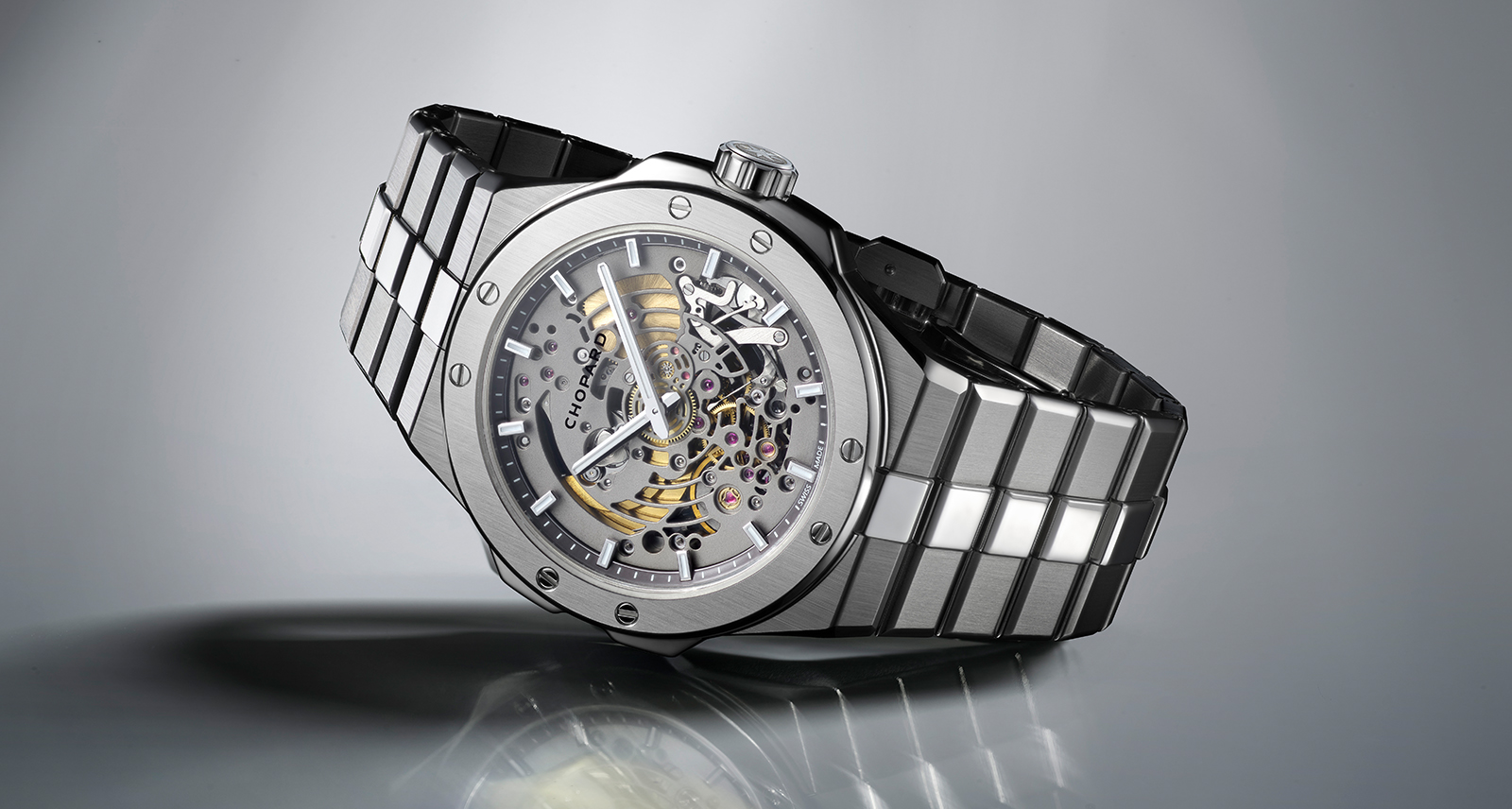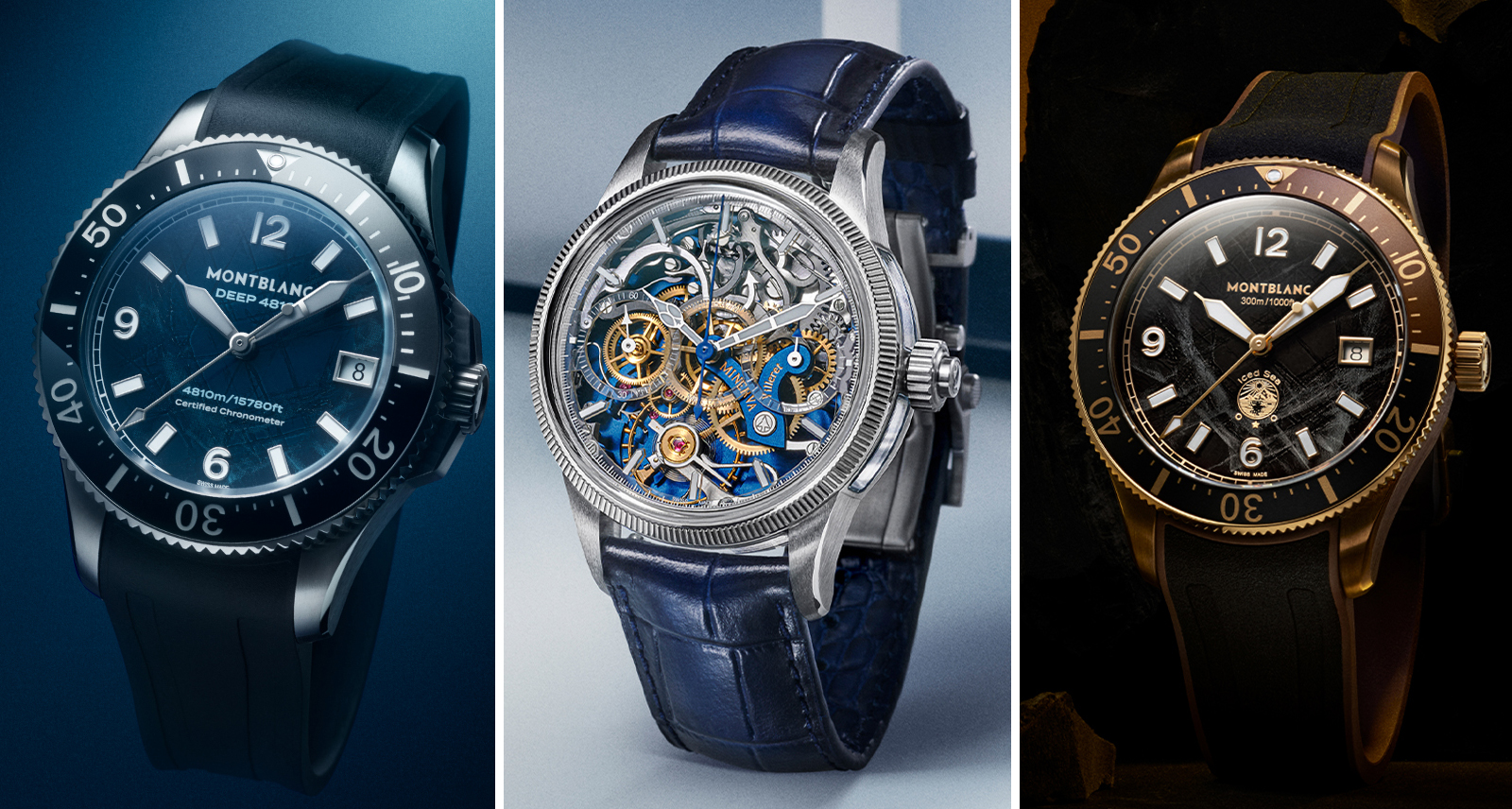The Education of Anthony Mackie
By the time Anthony Mackie calls me from New Orleans, I’ve already binged 8 Mile, The Hurt Locker, a handful of Avengers movies, and Mackie’s latest superhero performance, The Falcon and the Winter Soldier. I can’t see him (a Zoom is ideal for these sorts of things in pandemic times) but I don’t need to; I’d recognize his voice anywhere. “Coming from New Orleans, we don’t speak English like humans,” says Mackie, laughing and explaining why voice and speech training was especially challenging for him as an aspiring actor. “[But] when I got to Juilliard, I had this teacher named Denise Woods who made it very clear to me that I shouldn’t lose that spark, that New Orleans part of me.” Mackie seems to have taken Woods’s advice seriously. He isn’t calling from New Orleans because he decamped there to wait out the pandemic, but because it’s home. It’s here that Mackie is raising his four sons, and it’s here that he remains, Hollywood fame and all.
Mackie’s rise to stardom can’t be described with adjectives like “sudden” or “meteoric.” Instead, over the past 20-odd years, the 42-year-old actor has steadily accumulated credits in indie films and Hollywood blockbusters, on Broadway and off. He effortlessly slips from hero to villain, dramatist to action star, leading man to supporting actor. Onscreen, he’s played a U.S. Army sergeant, a boxer, Martin Luther King Jr., a drug dealer, an artist coming to grips with his sexuality, a rapper (twice), and one of the first Black bankers in U.S. history. In a recent interview with Variety, Mackie recounted a known joke in Hollywood: if you’re a white actor looking for an Oscar nomination, play opposite him. First, there was Eminem in 8 Mile in 2003 (Eminem won best original song for Lose Yourself). Then Ryan Gosling in Half Nelson in 2007. And then Jeremy Renner in The Hurt Locker in 2010.
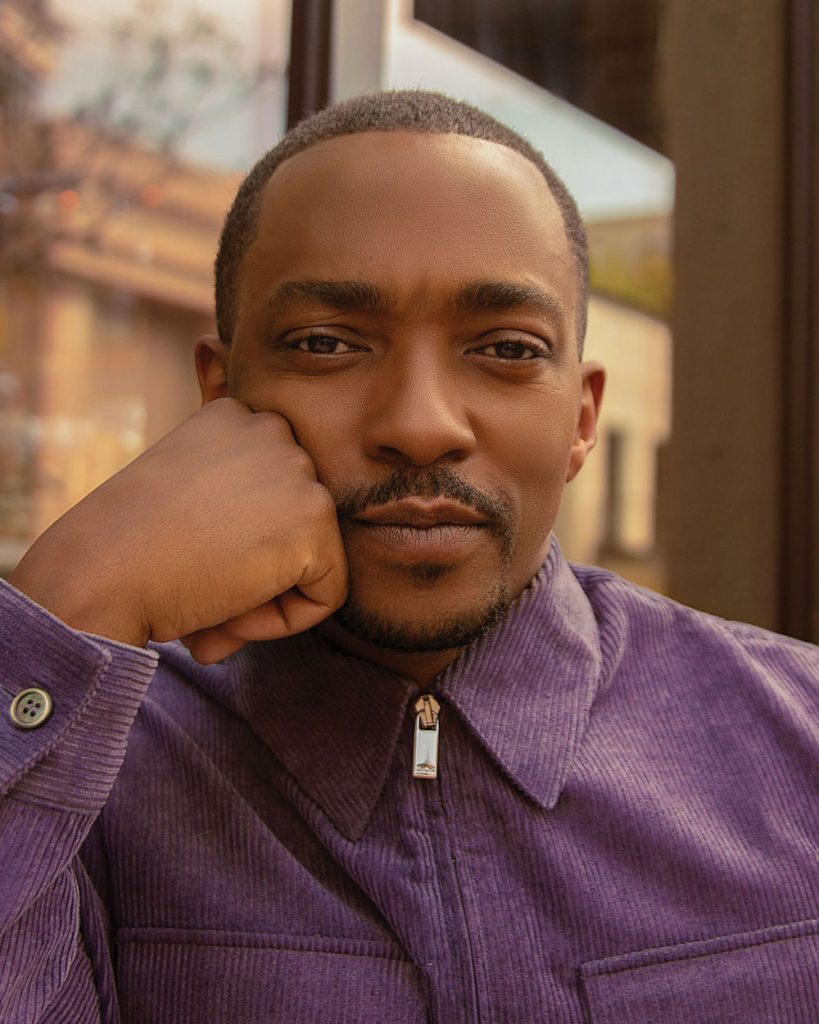
The role of a lifetime, however, arrived in 2014, when Marvel cast Mackie as Sam Wilson a.k.a. Falcon, a U.S. Air Force veteran turned airborne superhero fitted with red-tinted goggles and a pair of mechanical wings. While Falcon has typically been found flanking Captain America or fighting as part of the Avengers’ ensemble cast, he levelled up to leading hero, alongside Winter Soldier (Sebastian Stan), earlier this year with the six-part The Falcon and the Winter Soldier. When the show — a more character-driven spin on the superhero format — debuted on Disney+ back in March, the streaming platform announced that it was the most watched premiere in its history.
Anthony Mackie was born in New Orleans in 1978, the youngest of six children. As a kid, he was rambunctious enough that his school principal recommended Ritalin. A perceptive teacher instead recommended a creative outlet for his excess energy. In second grade, Mackie made his onstage debut with a puppet play based on the song “Waltzing Matilda,” said to be Australia’s unofficial national anthem. What Mackie remembers is the standing ovation. “[It took] three curtain calls for a puppet play? From that moment on, I loved the idea of performing,” he says.
The theatre also proved to be a supportive home for an adolescent Mackie. “I always felt like I was at a disadvantage because of the race relations of things and the education system in New Orleans. I never felt adequate,” he says. “And then I read my first Shakespeare play. I got it. I felt informed. [That] this white dude could write a play 450 years ago that I could relate to today changed my perspective immensely.” Mackie began devouring the works of famous playwrights like Ibsen, Shaw, and Chekhov. He began listening to composers like Stravinsky and studying theatre practitioners like Meisner and Brecht. He even took clown classes and studied kabuki, a type of Japanese dance-theatre. “All these things just started falling into place,” he says. “I found myself in the theatre. I became the man I wanted to be in the theatre.”
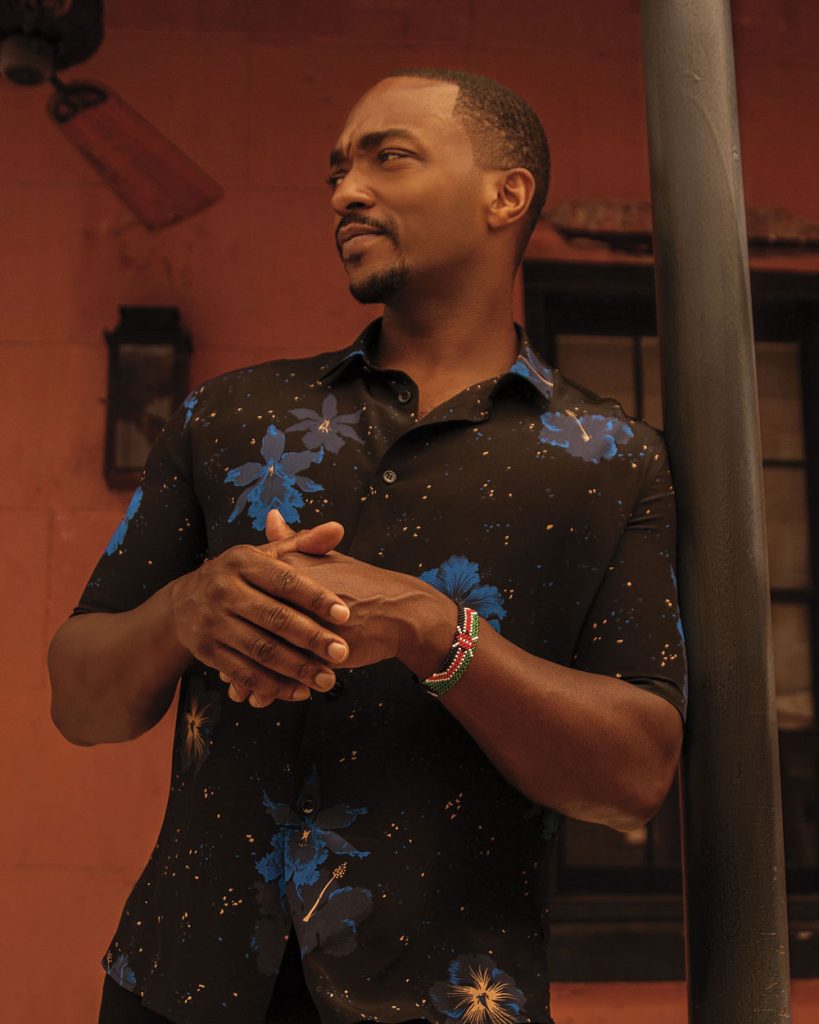
At 17, Mackie moved to New York City to attend Juilliard. Before graduating in 2001, he played Tupac in an off-Broadway production of Up Against the Wind, a classmate’s play about the rapper’s life. The legendary casting director Mali Finn saw Mackie’s performance and urged him to audition for 8 Mile. He got the role of Papa Doc, a rival rapper who Eminem finally bests in a rap battle by exposing Papa Doc’s middle-class roots as a private-school kid with happily married parents.
8 Mile is often credited as Mackie’s first film role, but in reality, it was Brother to Brother, an indie that premiered at Sundance in 2004. (Its budget was so small that it ran out of money halfway through filming. Production paused and Mackie filmed 8 Mile.) After 21 years as an actor, Mackie still thinks his performance as Perry, an art student disowned by his family for being gay, is his best work yet. It was certainly formative: acting alongside Tony Award–winner Roger Robinson helped Mackie differentiate between acting for the stage and the screen. “My first day on set, we do a scene, and Roger pulls me to the side and goes, ‘Anthony, you have to remember, your face is going to be 10 storeys high.’ He was like, ‘I can hear what you’re thinking from over here. Stop acting’,” recalls Mackie. “Every day he was giving me lessons — jewels — about how to perform on film, instead of the almost absurdity of acting on the stage, because when you act on the stage, you’re acting for the people in the back of the house. When you’re acting on film, you’re acting for the people in the front row.”
Mackie credits his theatre education for his versatility as an actor. It’s why his performances — like that of Sergeant J.T. Sanborn in Iraq War drama The Hurt Locker, perhaps his most acclaimed to date — are dynamic and nuanced. In one scene, Sanborn suggests “accidentally” killing the film’s protagonist. In a vacuum, it’s a villainous act, but Sanborn isn’t a villain; his actions are mitigated by his desire for self-preservation. Mackie’s performance oozes depth appropriate for the moral complexity and delirium of war. Although he wasn’t nominated for a best supporting actor Oscar for his performance (The Hurt Locker netted nine nominations and won six, including best picture), Mackie suspects it’s ultimately what landed him in the Marvel Cinematic Universe four years later.
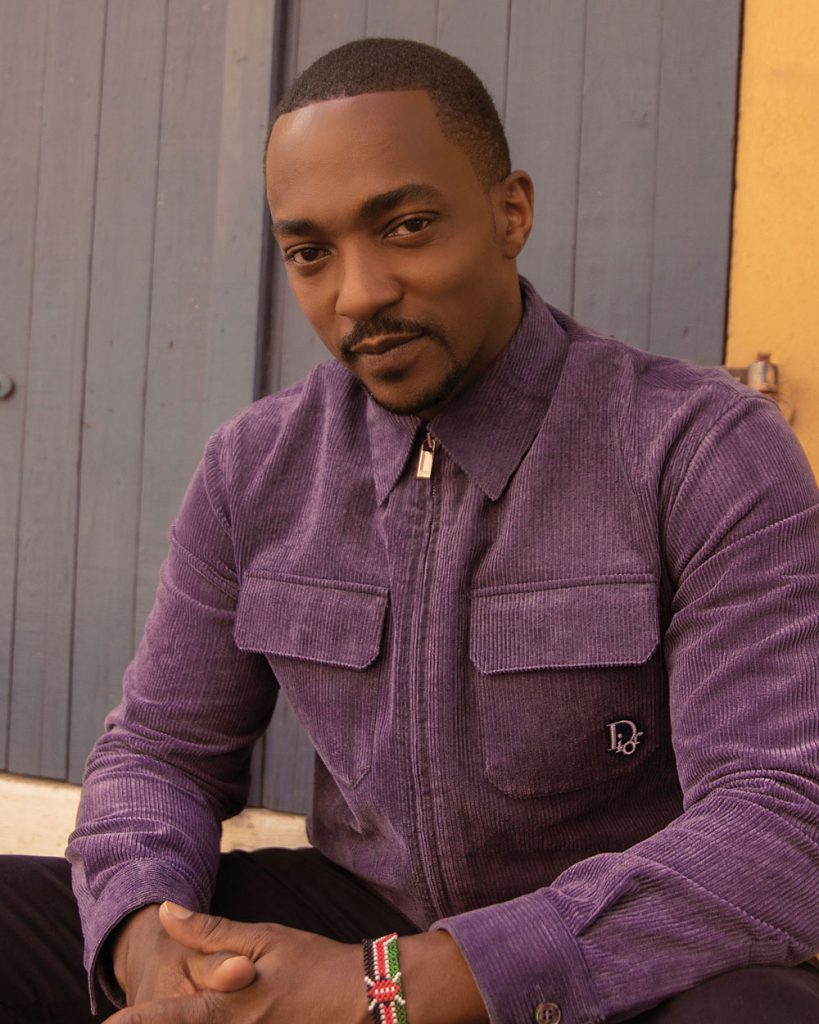
Speaking to Mackie, I’m curious to know what drew him, a trained stage actor, to strapping on a set of mechanical wings. In 2019, Martin Scorsese caused a minor furor when he said that superhero movies weren’t cinema, but “theme parks” that prioritize spectacle at the expense of storytelling and character. But Mackie’s reason for becoming a superhero is, above all, the same reason that the Marvel Universe is the highest-grossing film franchise of all time: fun. “As an actor, I’ve never worried about being pigeonholed, but I [have] worried about getting bored. When my friends and I would put on plays, we’d put on plays because it was fun. I’ve never wanted to get in a position where acting wasn’t fun,” says Mackie. “And when I watched Batman as a kid, it looked like Jack [Nicholson] was having fun as the Joker. It looked like Danny DeVito was having fun as the Penguin. Michael Keaton was definitely having fun as Batman.”
Mackie is right: superheroes are fun. But his Falcon is also socially significant. For decades, superheroism has been tethered to whiteness, a reality that’s abundantly clear to every non-white kid that’s woken up early on a Saturday morning to watch cartoons. While there is a danger in boiling every story and performance from creators of colour down into milestones and broken barriers, the reality is that Mackie’s Falcon is today’s most prominent Black onscreen superhero. And he’s well aware of the importance of such representation. “Before they made [Wonder Woman 1984], I spoke up and said that little girls deserve representation. And little boys need that too. It means a lot to my sons to be able to see a female superhero kicking ass,” says Mackie.
While I’ll save you the plot details, know this: The Falcon and the Winter Soldier ends with Falcon becoming the new Captain America — the Captain America. It’s a reframing of the most American of heroes, one that has always represented the nation’s most idealized vision of itself in a package of bulging muscles and white skin.
Marvel has made a concerted effort to diversify its storylines in recent years, but it hasn’t always been reflected behind the scenes. Last year, Mackie criticized his employer by pointing out that he had starred in seven Marvel productions, yet nearly everyone on all seven sets had been white. “Now, if you look at a Marvel set, there’s a growing number of women and people of colour in positions of power,” says Mackie, optimistic that progress is being made. “[And] there are a lot of changes happening in the Marvel Universe with so many characters — so many female characters, so many characters of different races and backgrounds — being brought to the forefront. I think phase four is going to be really exciting because it’s going to deal with more grounded and realistic everyday issues.”
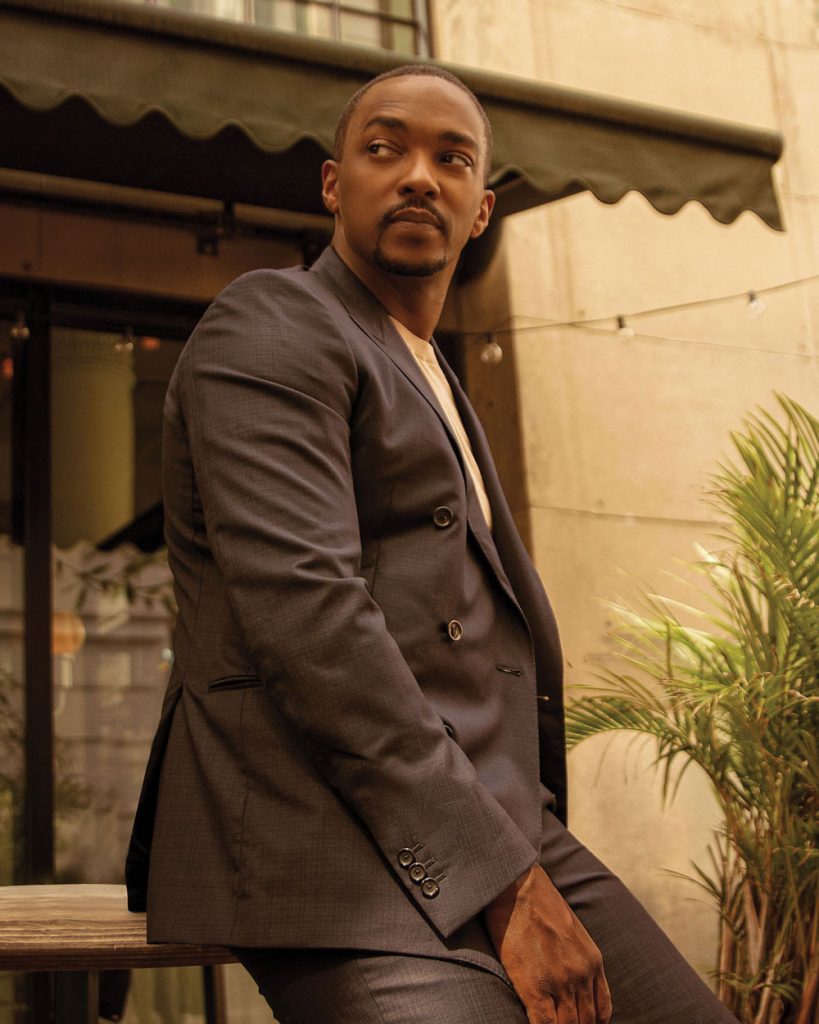
As Mackie gears up to lead one of the world’s largest film franchises, it’s hard not to feel all warm and fuzzy about his success. Aside from the fact that he’s affable and charming, his ascent appeals to a base-level hope that we all have: that hard work, talent, and tenacity pay off. “When I did The Hurt Locker, nobody knew it was going to become what it became. Nobody knew 8 Mile was going to become what it became. But it’s those small building blocks [that] build up into opportunities,” says Mackie. “I find it hilarious that people are surprised that the same person who played Papa Doc [in 8 Mile] is now Captain America. That’s the ultimate compliment to a career.”
Mackie is also eyeing a return to the stage. It’s trickier now as a father, as theatre productions often require actors to relocate for the better part of a year. “That’s a lot of soccer games I’m going to miss, a lot of shit I’m going to miss,” says Mackie. His solution: start his own theatre company at home in New Orleans. He is looking for a space, but he already has the cast figured out: a mix of local theatre friends and actors from elsewhere who want to spend a few months in New Orleans, away from Hollywood or Manhattan.
The pandemic’s only upside, says Mackie, is all the time he has spent at home. I ask him what it’s like to now go around New Orleans carrying the mantle of a character as iconic as Captain America. “I don’t really know yet,” he says. “Nothing has changed in my neighbourhood. My sisters still bully me. I still cut my grass. But I look forward to the things that will come with it. I’m very excited by what it will mean to the surrounding world [and] I look forward to seeing what the future holds for my character. But that’s it as of now. Because of COVID, I’ve been a superhero locked indoors.”
Lead image: Sweater and pants (both price upon request) by Prada.
Photography: Juwan James
Styling direction: Jeanne Yang (The Wall Group)
Styling: Ali McNally
Grooming: Allison Lacour
